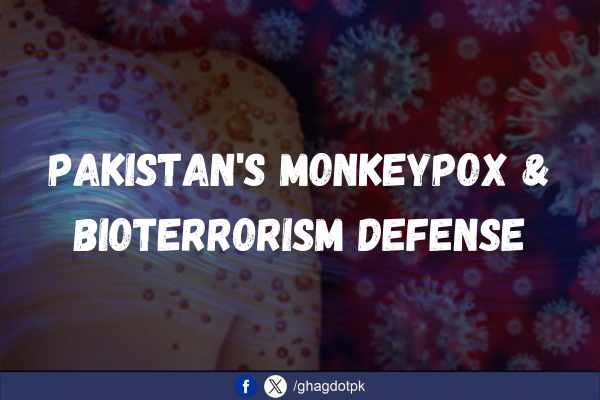By Ashima Gul
“History has shown us that the most dangerous enemies are not always those we can see, but those we cannot detect until it is too late.” This quote reflects the shift from traditional warfare to more covert, insidious forms of conflict. In today’s era of hybrid warfare, the threat of biological warfare has gained new significance amid recent global health crises.
The surge in Monkeypox cases globally has sparked debates about the potential use of viruses as weapons. Like COVID-19 before it, Monkeypox raises questions about whether these diseases are naturally occurring or part of a more sinister plan. Although no direct evidence suggests Monkeypox is man-made, the possibility of its weaponization cannot be dismissed.
Monkeypox and Biological Warfare Concerns
Monkeypox, historically confined to Central and West Africa, has recently spread to non-endemic countries, leading to speculation about its origins and potential as a biological weapon. On August 14, 2024, the World Health Organization (WHO) Director-General declared the mpox outbreak a public health emergency of international concern.
Experts have also raised concerns about the potential for diseases like Monkeypox to be used in bioterrorism. Dr. Ali Khan, a former CDC director, noted that Monkeypox’s stable transmission and clear symptoms could make it a candidate for weaponization. Similarly, Dr. Peter Jahrling, a virologist at the National Institute of Allergy and Infectious Diseases (NIAID), warned that zoonotic viruses like Monkeypox could be manipulated to enhance their spread, increasing the risk of their use in biological warfare.
A Dark History of Bioterrorism
Biological warfare has a chilling history. The Japanese military’s Unit 731 conducted horrific experiments on humans during World War II, developing biological weapons. More recently, the 2001 anthrax attacks in the U.S. demonstrated the potential for biological terrorism. Advances in biotechnology, like CRISPR gene editing, raise grave concerns about the creation of highly dangerous, artificially engineered pathogens.
Pakistan’s Response to Emerging Biological Threats
Pakistan’s effective handling of the COVID-19 pandemic showcases its ability to manage biological threats. The NCOC’s data-driven approach allowed Pakistan to implement effective measures tailored to the evolving situation. The Pakistan Army’s role in establishing field hospitals and enforcing lockdowns was crucial in mitigating the pandemic’s impact.
Pakistan’s security agencies, particularly the Inter-Services Intelligence (ISI), have enhanced their capabilities to detect and counter biological threats.
Pakistan’s defense against emerging biological threats is a beacon of hope, exemplified by its robust response to COVID-19, ongoing biosecurity investments, establishment of The National Institute for Biotechnology and Genetic Engineering (NIBGE), implementation of the National Laboratory Biosafety and Biosecurity Policy, adherence to the International Health Regulations IHR, and strengthening of laboratory services, all underscoring the nation’s commitment to safeguarding its citizens and bolstering national security against evolving biological challenges.






